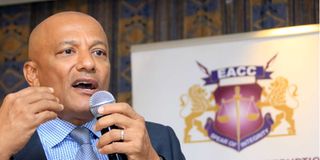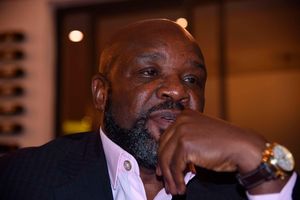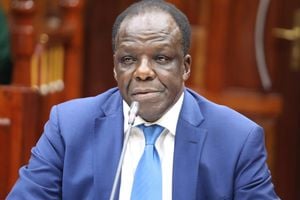
The Ethics and Anti-Corruption Commission (EACC) chief executive officer Twalib Mbarak.
The Ethics and Anti-Corruption Commission (EACC) is not comfortable with the push to limit the qualification of the agency’s chairperson to an individual qualified to be a judge of the High Court.
The push to reform the EACC leadership is contained in the Ethics and Anti-Corruption (Amendment) Bill, 2024 that is already at the National Assembly.
The Bill, a product of the National Dialogue Committee (Nadco) report that was adopted by Parliament, targets section 5 (1) of the EACC Act as it proposes to cushion the current chairperson from the application of the law should it be enacted as proposed.
“The chairperson of the commission shall be a person who qualified to hold the office of a judge of the High Court under the Constitution,” it reads.
The Bill is in the name of Leader of Majority Kimani Ichung’wah and former Minority Leader Opiyo Wandayi, who has since been named the Energy Cabinet Secretary.
In a submission to the National Assembly Justice and Legal Affairs Committee that is processing the bill for debate in the House, EACC Chief Executive Twalib Mbarak said the proposed amendment would limit the leadership of the commission.
“Having carefully considered the proposed amendment, the commission opposes the bill,” Mr Mbarak said in his submission to the House.
“Based on experience, there is no added advantage of having a lawyer over the other professions.”
He added that the term of service of the EACC chairperson is on a part-time basis with functions related to strategy and policy “not operational in nature to warrant a legal mind”.
Mr Mbarak said the proposed law does not make sense, considering that the commission has a fully-fledged legal services directorate with some of its officers holding qualifications of a judge.
Functions of the directorate include reviewing evidence in the course of investigation to see if it meets the legal threshold and advising the commission on any legal issue before it.
EACC also says restricting the role to the legal profession amounts to excluding candidates from other professions or backgrounds, “which could result in lack of diverse competencies and expertise” . It says this may limit diversity in the EACC leadership.
The commission warns that while the legal profession may possess strong legal expertise, it may lack skills and experience in leadership and other areas relevant to anti-corruption work, including investigation, financial analysis, corruption prevention and advocacy.
“If passed, the bill will likely portend missed opportunities for innovation,” Mr Mbarak said.
Other than the law degree, a person is qualified for appointment as EACC boss if he or she meets the requirements of Chapter Six of the Constitution in terms of leadership and integrity and has had “a distinguished career in their respective field”.
A person is also considered qualified for the job if the individual has knowledge and experience of not less than 15 years in any of the fields of ethics and governance, law, public administration, leadership, economics, social studies, audit, accounting, fraud investigation, public relations and media or religious studies or philosophy.
The EACC chairperson has previously been occupied by various professionals including a lawyer qualified to hold office of a judge of the High Court.
For instance, Mr Mumo Matemu, a lawyer, has previously chaired the commission.
Currently the commission is chaired by Mr David Oginde, an architect and a retired Bishop, who succeeded Archbishop (Rtd) Eliud Wabukala.
Previously, under the old constitution, Mr Arron Ringera was the director of the anti-graft body assisted by Dr Smokin Wanjala, the current Supreme Court judge among others.
When Justice (Rtd) Ringera left, he was succeeded by Dr Patrick Lumumba, a law scholar.
At the time, the state agency was called the Kenya Anti-Corruption Commission (KACC).
It was overseen by an advisory board that would later oversee its transition from KACC to EACC following a review of the law.
The advisory board was chaired by city lawyer Ahmednassir Abdullahi for five years from 2003 with Ms Fatuma Sichale, the current judge of the Court of Appeal, as his vice chairperson.
In 2009 city lawyer Okong’o Omogeni, the current Nyamira Senator took over from Mr Abdullahi and was succeeded by Dr Tom Ojienda, a professor of law who is the current Kisumu Senator.
The Bill seeks to give effect to some of the recommendations and views of the public that were submitted during the Nadco discourse on the issues of electoral justice and related matters, outstanding constitutional matters, fidelity to political parties and coalitions and the law of multiparty democracy.









